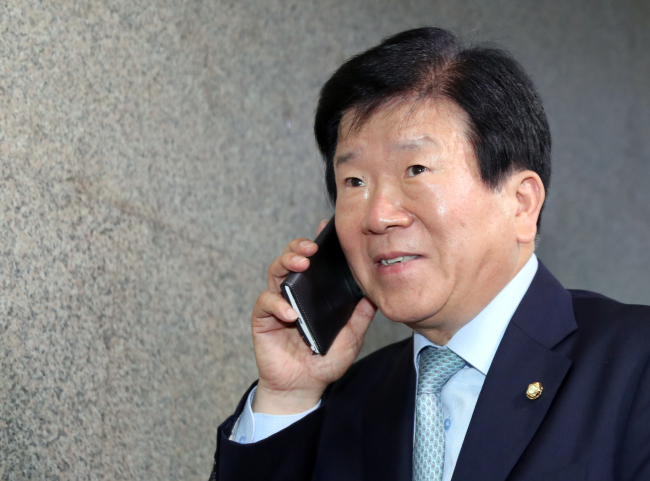President Moon Jae-in on Friday tapped Rep. Park Byeong-seug of the ruling Democratic Party of Korea as chief of his delegation to attend a forum in Beijing amid spats over a US missile shield, government and party officials said Friday.
The five-term lawmaker will steer Seoul’s delegation for the Belt and Road Forum, slated to open in Beijing on May 14. The two-day event is designed to discuss Chinese President Xi Jinping’s initiative to build a new Silk Road, dubbed “One Belt, One Road,” which includes laying infrastructure throughout Asia and Europe.
 |
Rep. Park Byeong-seug of the ruling Democratic Party of Korea(Yonhap) |
“The dispatch of the delegation is in line with the Chinese government’s official request,” Seoul’s Foreign Ministry said in a statement. “Through the attendance, we’re seeking to explore ways to boost bilateral cooperation including our participation in the Belt and Road initiative.”
The focal point is whether Park will play a special envoy role to meet with top Beijing officials and pave the way for a thaw between the two countries. Their relations have been strained in recent months as China embarks on crippling economic retaliation against South Korea over its decision to station the US’ Terminal High Altitude Area Defense system.
In their first phone call on Thursday, Moon offered Xi to dispatch a group of special envoys to discuss the issue, taking issue with South Korean businesses’ sufferings and stressing the urgent threats from North Korea. Xi welcomed the proposal, saying he would also redouble efforts to resolve the nuclear problem.
Park, a journalist-turned-politician, has for decades built China ties and became chair of an association of South Korean and Chinese legislators last month. While at the JoongAng Ilbo daily, he worked as its Hong Kong correspondent, and as a lawmaker, he accompanied on then President Roh Moo-hyun’s visit to Beijing in 2003.
Meanwhile, Moon is reportedly seeking to name Hong Seok-hyun, retired chairman of cable TV network JTBC and a former ambassador to the US, as a special envoy to Washington.
For Japan and Russia, the president is considering senior ruling party members Reps. Song Young-gil and Moon Hee-sang, respectively.
With pressing foreign policy and security issues at hand, speculation is spiraling over Moon’s picks for top diplomatic and defense posts.
Cheong Wa Dae on Thursday unveiled its plan to refurbish the presidential office, which will reinforce the National Security Office by integrating the team of the foreign affairs and security secretary.
Among the names being floated for national security chief are Chung Eui-yong, a former Ambassador to Geneva who led a group of Moon’s foreign policy advisors during the election campaign; Wi Sung-lac, a former ambassador to Russia and chief negotiator for the six-party denuclearization talks on North Korea; and Lee Soo-hyuk, a former ambassador to Germany and representative to the six-party talks.
Lee is also believed to be considered to be the foreign minister, alongside Song, Cho Byung-jae, a former ambassador to Malaysia and Myanmar, and Kim Ki-jung, dean of the Graduate School of Public Administration at Yonsei University.
Potential unification minister candidates include Song, Democratic Party floor leader Woo Sang-ho and Park Sun-won, a former presidential secretary for unification, foreign affairs and security.
For ambassadorial posts, Moon is reportedly mulling his close associate former Democratic Party lawmaker Noh Young-min for China, and former Ambassador to Geneva Chung Eui-yong, who led a group of Moon’s foreign policy advisors during the election campaign, for the US.
Contenders for the defense minister post include retired Chiefs of Naval Operations. Song Young-moo and Hwang Ki-chul, as well as former chairman of the Joint Chiefs of Staff Jeong Seung-jo.
By Shin Hyon-hee (
heeshin@heraldcorp.com)







![[Today’s K-pop] Blackpink’s Jennie, Lisa invited to Coachella as solo acts](http://res.heraldm.com/phpwas/restmb_idxmake.php?idx=644&simg=/content/image/2024/11/21/20241121050099_0.jpg)
